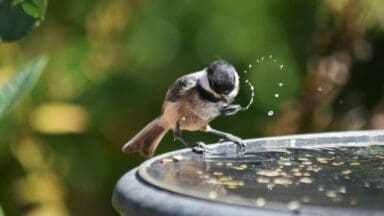
With recent high temperatures across the country leading to heatwave warnings and parts of the country experiencing drought, charity SongBird Survival has called on the public to provide fresh water daily to help at risk songbirds. The charity says that providing water in the summer months, rather than bird food such as seeds, fat balls or peanuts, is the best way to help songbirds.
According to the charity, scientific research has found providing food via bird feeders in the summer can have unintended consequences for songbirds. Avian diseases, such as Salmonella and Trichomonosis have increased as garden feeding has become more prevalent.
Dr Alexander Lees, Reader in Biodiversity at Manchester Metropolitan University adds: “Feeding garden birds is a national pastime for the British and the most common opportunity for many of us to connect with nature. However, there is an increasing body of scientific evidence which links garden feeding to detrimental impacts including enhanced disease transmission and competition between species, which is contributing to steep declines in several once common species, like willow tits and greenfinches. There is an urgent need to re-evaluate guidelines on what, when, where and how much food we provide to avoid these unintended negative impacts.”
More than half of our UK songbirds are threatened or already in decline. Songbirds, including those that are on the UK Conservation status red list like greenfinches and house martins, lose more water than other birds so need to drink more often. Over recent years, feeding birds has become very common, where 60% of people who have an outdoor space feed birds.
Susan Morgan, CEO of SongBird Survival explains: “Although we recognise many people still enjoy feeding birds during the summer, we’ve made the difficult decision to ask bird lovers to stop. In the summer months, there are plenty of insects, berries, and seeds available, so there’s no need for us to put out extra food. Research has also shown that feeding birds in summer may upset the delicate natural balance of different types of birds in your local area and may also increase the risk of disease spreading.”
SongBird Survival recommends putting out a shallow dish of clean water for drinking and bathing, which is to be cleaned weekly to prevent disease.
Garden designer Nicola Oakey, whose songbird-friendly garden for SongBird Survival won a Silver Gilt Medal at RHS Chelsea Flower Show 2025, said: “In my own garden, I tuck shallow saucers of water in places that have shelter from plants. This means the birds can bathe and drink with protection from predators. At this time of year, it’s tempting to cut back or deadhead plants that have finished flowering for the year. Many plants have really valuable seeds or fruits, such as perennial cornflower (Centaurea) and plume thistle (Cirsium), so, I would encourage people not to pick up their secateurs too quickly. Leaving that structure in our borders, especially over autumn and winter, provides vital cover and places for birds to forage for food.”
The UK charity, Songbird Survival is dedicated solely to halting and reversing the alarming population decline of songbirds and other small birds. It does this by supporting research carried out by experts at top universities and conservation organisations in the UK into the cause of the decline, and the solutions.

